Dear Parents of Children with SA/CRS,
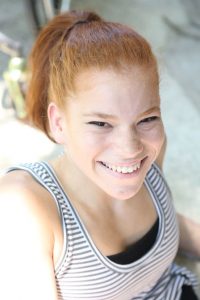 Hello, new parents! I know you are probably very concerned in learning that your child has sacral agenesis/caudal regression syndrome (SA/CRS). I know it’s not the path you would have chosen for yourselves or for your child. It is scary and overwhelming. I am someone who has grown up with this condition, and I thought it might be helpful to have some perspectives from my experience. I think this journey will be for you (and for your child) whatever you make it to be. My family and I chose to make it positive. Of course, there are some challenges, but it doesn’t have to defeat you or define you.
Hello, new parents! I know you are probably very concerned in learning that your child has sacral agenesis/caudal regression syndrome (SA/CRS). I know it’s not the path you would have chosen for yourselves or for your child. It is scary and overwhelming. I am someone who has grown up with this condition, and I thought it might be helpful to have some perspectives from my experience. I think this journey will be for you (and for your child) whatever you make it to be. My family and I chose to make it positive. Of course, there are some challenges, but it doesn’t have to defeat you or define you.
I am not a parent, so I decided to ask my mom about a message to new parents. She said, “As parents, you will be on a new journey with a child who has SA/CRS. You will meet new people and make new friends along the way. You will change who you are, in a good way. You will learn things that you never even thought about before, things that actually make you a better person. And all the while, you will be simply amazed at what your child CAN do, and all of the fear about what you imagine that your child can’t do will fade away. Someday you will even see this all as a gift. Right now, that feels impossible. But give it time.”
It’s natural to have various reactions to unexpected news. Responses include shock and fear, blame, cure seeking, frustration, anger, loneliness, compensation, discovery, and advocacy. I have so much that I want to share with you about all of these reactions, and what they mean for the journey of raising a child with SA/CRS.
An unexpected shock!
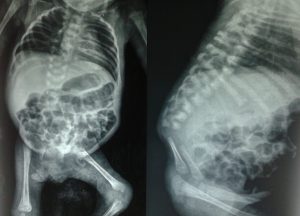
Unexpected news is a shock. At first, everything seems overwhelming. The unknown is scary, and because you don’t know much about what this diagnosis means, you may imagine that the dreams you had for your child will never become reality. The people I know with SA/CRS, like myself, have full and rich life experiences. They work and drive and clean house and cook and do laundry and shop for groceries. They have amazing hobbies and talents. They have friends and loving relationships and families. They make their own way in the world. My point is, the ideas you have when you hear a word like “disability” are going to change in this journey. It’s one of those things that will make you a better person in the end. But for now, it is still a big unknown, so it’s natural to feel isolated and alone. The medical information you receive can be very confusing. Some doctors make it seem as if the parents did something wrong, and some doctors make it seem as if there is little hope for the child, but I am living proof that kids with SA/CRS can have a great life, and iSACRA is an organization that ensures you are not alone in this journey.
Who is to blame?
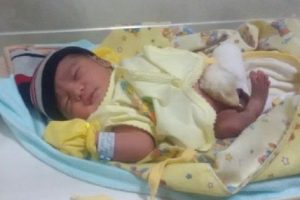
You may go through a time when you need someone to blame, maybe even blame yourself for your child’s condition. Sometimes in an effort figure out who is to blame, parents will search to find the “reason” for this condition. Parents wonder if there was something they did wrong during the pregnancy, or if it runs in families. There is often a lot of emotion and energy around who or what is to blame, and sometimes parents feel a lot of guilt. The answers about what causes this condition are not clear.
Even if there were clear answers about the cause, there is no one to blame, and really nothing is gained by blaming anyone or anything. I mean, suppose you find out that yes, it was because you ate that red snow cone when you were 2 weeks pregnant. So what? How does that change anything now except to make you miserable? What is, just is. Even if you run into a doctor who has the wrong information and tries to make this your fault, my thoughts are to not let anyone, including yourself, play the blame game.
If you are going to be there for your child, you can’t be focused on who is to blame. You may have nagging concerns about why this happened. Let them rest. Instead, you need to focus on your child. Blame leads to guilt, sadness, and anger. “Why didn’t someone warn me?” “Why did this have to happen?” “The doctor said it is my fault!” The problem is, the minute you start thinking about “fault”, you are already locked in a negative perspective.
A child translates this negativity to, “It’s MY fault”. Sooner or later, your son or daughter will notice that you carry around guilt, will sense your sadness, or anger. Your daughter will figure out that these feelings have something to do with her and who she is. Your son hears you when you use negative words to describe this condition, and he begins to see himself in a negative way. He starts thinking it is his fault for making his parents sad! Do you see how the blame just gets passed down to the child?
From a kid’s perspective, let me just say that it’s hard to have positive self-esteem when parents seem so upset and negative. I hope that it helps you to know that I don’t blame anyone for the way I am, and I don’t know and don’t even care what caused it; it’s just who I am. This condition is part of me, part of my identity. I like who I am, and isn’t that more important than worrying about why? So, enjoy your child. I hope you’ll find out that’s not so hard to do when you do it. There are going to be lot’s of people around with negative perspectives. As a parent it’s your job to find the positive, so that your child can find the positive too. It sure is a lot better than blaming yourself, and then making your child feel guilty about making you feel that way.
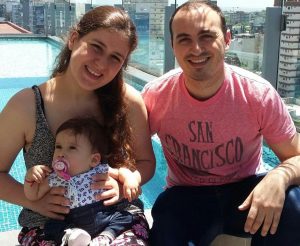
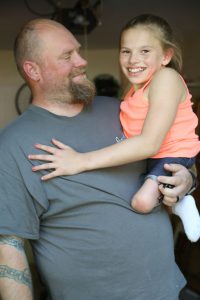
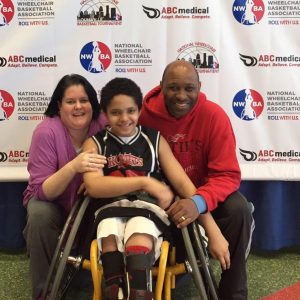
Is there a cure?
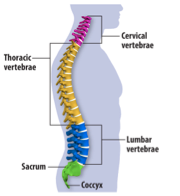
Another thought parents have is about cures. One of the first things people ask about when they learn of this diagnosis is whether there is a cure.
Let’s start right off by saying there is not a cure for SA/CRS, and there is no one “SA/CRS specialist, but there are a lot of treatments that improve the quality of life and there are many different specialists who address different parts of the body that may be impacted by thid condition. SA/CRS impacts each of us differently, and no doctor can tell you in the beginning just what your child will be able to do or not do. As your child grows, their unique abilities will reveal themselves.
 One concern parents have is whether their child will walk or not. It sometimes seems as if walking becomes the central focus. So, first, let me point out that there are a lot of things in life that are so much more important than walking. Many kids with my condition do walk, and some run and jump and so on, and on the other hand, some walk with braces and crutches or for short distances and some do not walk. “Not walking”, or transitioning from walking to a wheelchair as the body changes and grows over time, is not the end of the world. I know you associate negative things with the word “wheelchair”. Here is another thing that you might learn that will be a radical change in thinking. People who don’t use wheelchairs usually think of them as being confining and limiting. People who DO use wheelchairs often describe them as being a source of freedom and independence. These are just different mobility options and one is not better or worse than the other. It is finding the most effective and efficient way to get around that will be important.
One concern parents have is whether their child will walk or not. It sometimes seems as if walking becomes the central focus. So, first, let me point out that there are a lot of things in life that are so much more important than walking. Many kids with my condition do walk, and some run and jump and so on, and on the other hand, some walk with braces and crutches or for short distances and some do not walk. “Not walking”, or transitioning from walking to a wheelchair as the body changes and grows over time, is not the end of the world. I know you associate negative things with the word “wheelchair”. Here is another thing that you might learn that will be a radical change in thinking. People who don’t use wheelchairs usually think of them as being confining and limiting. People who DO use wheelchairs often describe them as being a source of freedom and independence. These are just different mobility options and one is not better or worse than the other. It is finding the most effective and efficient way to get around that will be important.
If a child needs treatments to gain walking skills, there are medical treatments to make it possible for some children with SA/CRS to walk, or to improve their gait. It’s quite amazing what can be done, and some surgeries are quite minor and have terrific results. There are also some things that can’t be done, and there are some things that can be done but are quite complicated, some may have poor long-term outcomes or have to be done repeatedly. Parents should definitely encourage children to maximize their potential and give them mobility options. Walking is a great way to get around, but parents should also remember that life is not only about walking. If walking means having to spend half of your life in a hospital having one surgery after another, then you really have to evaluate just how much effective and efficient walking is really going to be long-term. Sometimes a better quality of life comes by way of a wheelchair.
There are some of us with SA/CRS, as I mentioned, who walk just fine, or at least well enough to make it worthwhile. I am not one of those. I have one of the higher levels of involvement with this condition, including the absence of my entire lumbar and sacral spine and webbed legs that were fused in a cross-legged position. That made my seat width very wide because my knees stuck out at the sides. I have no ability to move my hips or legs. When I was 3 years old, the decision was made to remove the webbed legs at the knee. It’s called “disarticulation.” After that, I could move around a lot more easily “walking” on my hands and I could sit in a narrow wheelchair, which made pushing a wheelchair much more efficient. I was and still am delighted with the result. At the time, no one really thought about me walking on legs-that was not a goal for this surgery, but I was a gutsy kid with great balance, so we decided to give prosthetics a try.
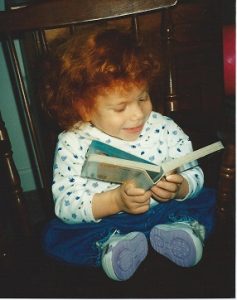
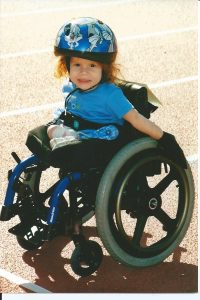
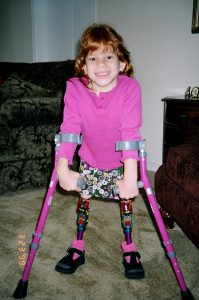
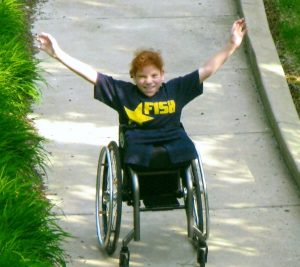
For some children with SA/CRS, walking with prosthetics is a great option. For me, it was okay but not really functional. I’m faster on my hands or on wheels. The experience taught me that walking actually doesn’t improve my ability to get around. It slows me down. So, I haven’t used my prosthetic legs since I was about 7 years old, and that’s fine with me. I use a wheelchair, AND I’m also a college graduate and I work full time and I just bought my own home. A wheelchair has not prevented me from making my own way in the world.
It’s important to explore options, but it’s also important to consider what really works best for your child. It’s not so important how I get from one place to another; but that I can get there quickly and easily. For me, the wheelchair is freedom and independence.
Walking is a frequent concern, but there are other issues actually more important than that for children with SA/CRS, including protection of our kidneys. Some people with SA/CRS have a lot of issues with bowel and bladder control. For new parents this seems daunting, but there are a lot of medical processes and procedures that make all of this quite manageable.
Why can’t this be easier?
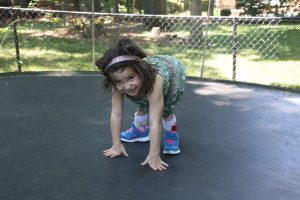
Another experience common to parents is frustration and anger. This may come from encounters with the medical establishment. Some doctors are great, but most doctors have typically not even seen a kid with SA/CRS before. It’s frustrating not to have a specialist who knows the answers, and it is even more frustrating to have doctors suggest treatments when they have not had any experience with this condition. Parents want answers and what they get is no information or misinformation. It’s very frustrating. It’s scary, too, because when a doctor takes out a growth chart and tries to tell you that you are not feeding your child enough because she isn’t even on the growth chart. Perhaps weight is a valid concern, or perhaps the doctor is just unfamiliar with the growth expectations for a child with SA/CRS. It is important for parents to consider medical advice, but it is also important to get second opinions and to talk to other parents of other kids like yours.
 Sometimes, if your child is very tiny or if your child’s legs are fused into a specific position, the car seats don’t fit, the highchair doesn’t fit, the pants don’t fit, the diapers don’t fit. It can be frustrating to do a lot of modifying, and the best way through this frustration is talking with others and also figuring out through trial and error what works best. I weighed 4 lb at birth. When I was 14 months old, I weighed 9 lb. At age 14, I weighed 45 lbs. I have a high level of fitness despite being small. It’s fine being small, actually it is a lot easier for me to get around when I don’t have a lot of weight. At this point in my life, I’ve learned to figure out ways to use anything I need to use. My mom has modified plenty of things, from snowsuits to ramps, to make things work better for me.
Sometimes, if your child is very tiny or if your child’s legs are fused into a specific position, the car seats don’t fit, the highchair doesn’t fit, the pants don’t fit, the diapers don’t fit. It can be frustrating to do a lot of modifying, and the best way through this frustration is talking with others and also figuring out through trial and error what works best. I weighed 4 lb at birth. When I was 14 months old, I weighed 9 lb. At age 14, I weighed 45 lbs. I have a high level of fitness despite being small. It’s fine being small, actually it is a lot easier for me to get around when I don’t have a lot of weight. At this point in my life, I’ve learned to figure out ways to use anything I need to use. My mom has modified plenty of things, from snowsuits to ramps, to make things work better for me.
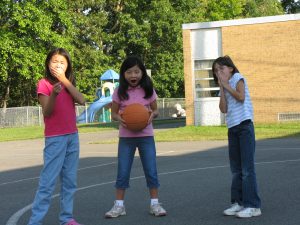 Another frustration is dealing with people who are curious, ignorant, or just plain rude. What is important to remember here is that your child is learning from you how to handle these encounters because once in school and for the rest of his or her life, there will be a need to have some skills and strategies to take charge of unpleasant situations. Although some who have SA/CRS have no outward physical differences, most have some physical characteristics that other people can see. In my case, my condition is very obvious. Some people become uneasy and avoid the issue when they see me. Some become overly curious and ask inappropriate questions. Some make comments that are negative and rude and hurtful. Some just stare, which is also rude. In my school, we learned options to deal with these encounters. They are good techniques for everyone to learn. You will find these tips on our isacra.org website. Another avenue that was helpful to me was being involved in disability sports and going to a camp where other campers had similar physical disabilities. In these activities, we all shared common life experiences of having a physical disability, so I was not “the only one”. That made me a more confident individual.
Another frustration is dealing with people who are curious, ignorant, or just plain rude. What is important to remember here is that your child is learning from you how to handle these encounters because once in school and for the rest of his or her life, there will be a need to have some skills and strategies to take charge of unpleasant situations. Although some who have SA/CRS have no outward physical differences, most have some physical characteristics that other people can see. In my case, my condition is very obvious. Some people become uneasy and avoid the issue when they see me. Some become overly curious and ask inappropriate questions. Some make comments that are negative and rude and hurtful. Some just stare, which is also rude. In my school, we learned options to deal with these encounters. They are good techniques for everyone to learn. You will find these tips on our isacra.org website. Another avenue that was helpful to me was being involved in disability sports and going to a camp where other campers had similar physical disabilities. In these activities, we all shared common life experiences of having a physical disability, so I was not “the only one”. That made me a more confident individual.
I’m going to make everything better!
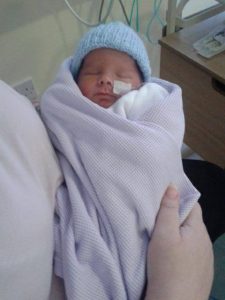
Another kind of attitude I have seen among some parents I call “compensation”. I think they are trying to somehow make up for what their child doesn’t have or can’t do. So, they do more for their child than they would for another. They buy them more, fuss over them more, get overly involved in everything, and help them do everything. Now, I sure don’t mind being spoiled (who doesn’t?), but at the same time, I realize that it’s not good for me.
If everyone is bending over backward to do everything for me, I am learning to be dependent instead of independent. Believe me, when you are not a cute little kid anymore, people are going to be much less interested in hanging around dressing you, carrying you, and lifting you. I can get in my own wheelchair, so don’t pick me up. I can get the door open myself, so don’t do it for me. I can push myself, so don’t push me. I don’t need to be lifted, carried, fed, dressed, or anything else. Don’t shower me with gifts. (Actually, I don’t mind that part, but my mom says I need to learn to “appreciate hard work for a fair and just reward”.) Don’t fuss over me. It will make me an angry teenager, and no one wants an angry teenager (ok, you might get one anyway, but at least you didn’t make the problem worse). Basically, expect at least the same from me as from any other kid. I may have to do things differently, but I’ll figure it out.
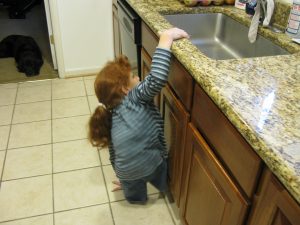
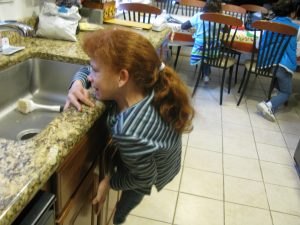
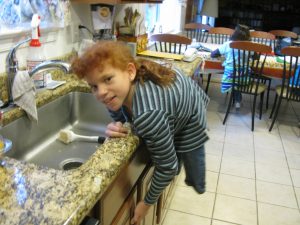
I have a lot to learn!
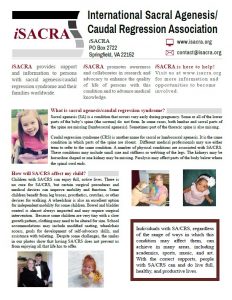
Another type of response is discovery. Parents may become very interested and want to find out all the information they can. There are so many things to learn. What is the best medical procedure? What is the best diet? What is the best kind of wheelchair? (Please note there is not really any such thing as “the best”.) There seems no end to the amount of information that an interested parent can find. I think this is a good thing for parents to do as long as you don’t drive yourself crazy trying to know everything. It’s important to become informed, to join organizations, to get to know adults who have this condition who can give you a long-range perspective, and it’s important to explore various options. You may never find the “best”, but you make the best decisions possible in the child’s best interest with the information you are able to gather. There are going to be a lot of things you can’t know, because the answers don’t exist, and because what is “best” for one person is not necessarily what is “best” for another. Sometimes you just have to make the decision that seems appropriate. Just make sure to involve your child in decisions, particularly medical decisions, as much as is age appropriate. Don’t pass off hard decisions on your child but do make your child a part of the ‘team’ in the decision-making process when you can.
I hope the iSACRA website and Facebook group help interested parents find information. It’s just important during this process to remember that your child is more than just a fascinating medical condition.
Let’s move forward!
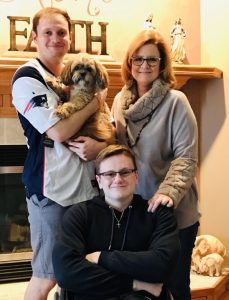
The last response is what I call advocacy, and it’s one I really appreciate. That’s when parents “get it.” So, if I could describe these parents, I would say they are teaching the tools that the child needs to succeed in life. They are making sure their child is treated fairly–not coddled but also not ignored. They are advocating for their children at school and in any other activity and also teaching their child how to advocate for themselves.
They accept their children for who they are. They listen when their children are having a down day, and they don’t try to brush off hard stuff like it’s no big deal. They listen, and they try to come up with options that might make things better. They give their children a say in what, when, and how to address problems, but they are still the adult in the situation and don’t just leave the child to flounder without support. They are a support and a guide and they give a child resources to build independence skills. They have high expectations for their children.
In summary, even though you may feel afraid and discouraged at first, you will find that your child with SA/CRS is not so different from any other child, so treat your child that way. Don’t set limits on what you can expect for your child, because she or he will do way more than you expect. Let the adults who have lived a lifetime with this condition into your lives as wise guides.
I covered a LOT of information here, but I hope it helped you feel a little more comfortable with some of the things you might have been most worried about, and I hoped you learned some things that allow you to see some of the possibilities of this journey. iSACRA welcomes you. If you are already doing things such as finding out about iSACRA and reading the information we offer, you’re going to be a great parent!
Your friend,
Jessica
